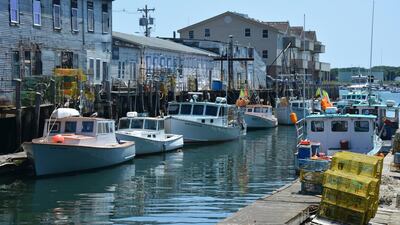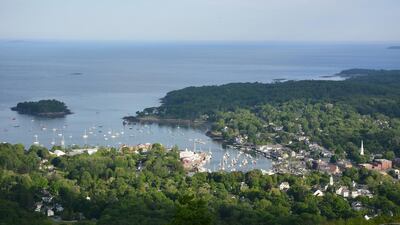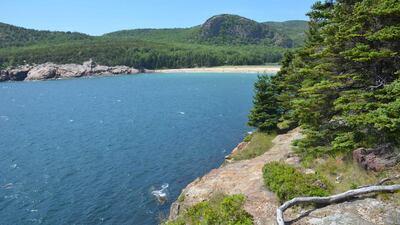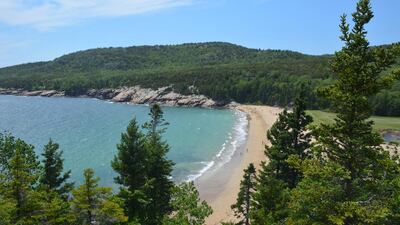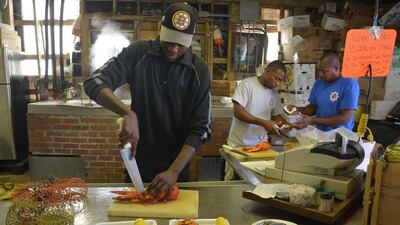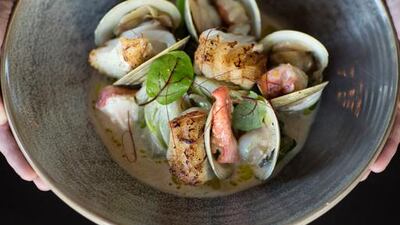“Come to Maine. I have a summer house.” There was no further encouragement needed. I land in the state known appropriately as “Vacationland” after a 90-minute direct flight from New York City, and the holiday atmosphere begins straight away. Unsurprisingly for a town with only 33,000 people, Bangor airport is empty and the hire car I’ve booked is waiting for me in the car park, says the woman at the Hertz counter, handing me the keys. “Does it have SatNav?” I ask. “Oh no, none of our cars do,” she says, unworried. I use the airport Wi-Fi to plot my route on Google Maps, and I’m on my way.
I head south through a state that’s larger than the other five New England states combined; 17 million acres of land with 6,000 lakes and ponds, plus a coastline that’s longer than California’s, at 5,600 kilometres.
The roads are quiet and easy, and the Nissan Altima is a joy to drive. Highway 1A follows the Penobscot River, cutting through thick forest and small settlements. The next main town is Belfast, a handsome, red-brick cluster with a population of 7,000, on the bay of the same name. My friend's place is right on the water in Northport (population 1,500), and has the feel of a log cabin. Like many homes up here, the property hasn't been "winterized", meaning it isn't insulated against the harsh winter weather and is closed for half the year. We sit out on the deck, watching the sailing boats navigating the Penobscot Bay, and the views across to the island of Islesboro. We go kayaking and watch the stars from beside a campfire in the garden, before an elaborate dinner at Natalie's, a Relais & Chateaux restaurant in nearby Camden, another very pretty and now expensive harbour town that was the childhood home of the Pulitzer Prize-winning poet Edna St Vincent Millay. At the top of the nearby Mount Batty in the Camden Hills State Park, there are quotations from Millay's poem Renascence, which is said to have been inspired by the view over the surrounding bays.
The biggest draw of the area, though, is Acadia National Park, which we tackle on a day trip. It's a two-hour drive north-east, and, compared to the big-name parks such as Yellowstone and Grand Canyon, visitor numbers are modest – but there's nothing low-key about the dramatic entrance across a bridge from Trenton to Mt Desert Island with sparkling beaches and rugged granite coves either side. After a lunch of pho in a Vietnamese cafe in Bar Harbor, we pay our entrance fee and drive in a clockwise loop around the park, stopping for short hikes. We drive to the top of Cadillac Mountain, the park's highest, for views in all directions; some visit at 4am to catch the first sunrise in the United States. We visit the beach at Echo Lake, and though it looks idyllic, the water is still cold in June, so we don't swim. Some of the park's backroads, snaking through small settlements and around craggy loch-like lakes, surrounded by birch, aspen and oak trees, are heartbreakingly beautiful.
We stop for comfort food on the way back at Darby's restaurant in Belfast; and when we step outside into the night, the once-or-twice-in-a-lifetime "strawberry moon" is rising from behind a church. A full moon falling on the longest day of the year, the moon appears large and amber coloured because it sits low in the sky, in contrast to the highest point of the sun. The colour is linked to its light filtering through thicker, more humid air at the lower altitude; it loses its hue as it rises. We race down to the waterside to take photographs, but it's already turning pale, its light rippling between the small bays.
A visit to Maine wouldn't be complete without lobster, and we try the waterside Young's Lobster Pound in Belfast. After choosing a live lobster, it's sadly placed in a string bag and lowered into a cauldron of boiling water to be cooked. Sitting at picnic tables outside, we have ours served with fresh oysters on the half-shell and corn on the cob. Another notable local food stop is Pizza Permare on Route 1, the main coast road also known as the Atlantic Highway. It looks like a lorry stop but is a family-run restaurant serving delicious wood-oven pizza and salads.
After a few days and restful nights – dark and silent, except for the wind in the trees – it's time to continue my way south. After calling at our favourite coffee shop in Lincolnville, Green Tree Coffee & Tea, in a cabin-like structure which simply calls itself "Coffee Roasters" on the sign outside, I'm on my way along the two-lane road, with the coast on my left and woods with flower-filled meadows on the right. Rockport is like a mini version of Camden, and then there's Rockland, an art-and-foodie town that's said to be the "next Portland".
I press on south, taking a detour off Route 1 to drive the length of the Pemaquid Peninsula. Even more sleepy than the route I've just driven, the road ends at the Pemaquid Point Lighthouse, which dates from 1827 and offers dramatic views of the Atlantic waves crashing onto the rocky shoreline. Nearby are some other colonial buildings, such as the Pemaquid Hotel, dating from 1888, and an old wooden schoolhouse opposite, complete with a carriage house.
After getting back on Route 1 at Damariscotta, the coastal views from the road are much more industrial; partly, the broken nature of the coastline means the road here is further inland. I carry on south to Freeport, which is the home of the outdoor retailer LL Bean, and there are several tempting warehouse-style outlets. Unfortunately, I haven't got time to shop so keep going until I reach Portland, Maine's biggest city with a population of just 70,000.
Portland Maine, named after a small limestone island in the English Channel, is older than Portland Oregon, which was named after Portland Maine. Both cities have developed a reputation for their restaurants, and I first have dinner at Union, a smart, slick, ground-floor operation at The Press Hotel, a building that was home to the Portland Press Herald newspaper from 1923 until 2010 when it was converted.
Head chef Josh Berry, from Maine, uses seasonal ingredients from local farms and the menu manages to be satisfying, creative and reasonably healthy. My friend from Boston, who drives up for the evening, is as pleased as I am with the spread we order, starting with a pile of littleneck clams with garlic and chilli (US$17; Dh62.4) and a warm oyster mushroom salad with kale ($13; Dh47.4); then he devours the braised beef shoulder with roast bone marrow, mustard seeds and spinach ($29; Dh47.7) I have the local cod with peas and shaved smoked scallops ($27; Dh99). Dessert is an artisanal cheese plate with local honey, fruit chutney, walnuts and sliced bread ($18; Dh66). Service is excellent and unpretentious.
The next day I take a two-hour walking tour with local guide Linda Johnson, starting at the bronze Victor Kahill sculpture The Maine Lobsterman, which was created for the 1939 World's Fair. Founded by English settlers George Cleeve and Richard Tucker in 1633, Johnson explains that the city's Latin motto "Resurgam" is linked to the fact that it was destroyed four times: "by the French and Indian wars in the 1600s and in 1775 by the British. In 1866 there was a huge fire, 68 blocks were lost and 10,000 were made homeless. About 1,500 buildings were rebuilt within two years. So, it's a fairly young city, even though it's one of the oldest in the US."
Johnson takes me to the oldest building on the peninsula, the Wadsworth-Longfellow House, which is named after the poet who lived there. Originally a farmhouse, the building is well-preserved despite having gained an extra storey, and has a nice public garden at the back.
Most atmospheric is the cobblestoned downtown area, which leads downhill on to the old wharves. I stop at Duck Fat Fries, to try its greasy, salty but tasty namesake product, and Coffee by Design, which has several outlets and is one of the city's best coffee roasters. Though it's more touristy and mainstream, Portland Maine is much less affected than Portland Oregon; maybe it's the breezy weather with 26°C and sunshine, but I see more happy and smart but polite people having normal conversations, using fully-constructed sentences. Motorists stop as soon as you step into the road and the common sense, open vibe adds to the holiday atmosphere. "People are happy to be here," says Johnson. "They come here because it's safe, from places like Detroit where there are drugs, gangs, murders and shootings." That's in contrast to its 18th-century reputation as being riotous and vice-ridden, Johnson adds. "The people that were the first settlers were not puritans or pilgrims, this was a wild town with people who were working, trading. Religion was not what they were interested in, it was full of bars and brothels." And, although slavery was outlawed here, slaves were traded and slave ships built here, Johnson tells me. "Even Native Americans were sold as slaves, mostly to work in the Caribbean."
That night I take a sunset cruise around the Casco Bay aboard a 100-year-old schooner, which makes Johnson's history about the importance of the port over hundreds of years come together. Once we're out into the bay, the crew turn off the motor and pull up the sails for a hair-raising ride which has us clinging to the side of the boat for dear life (cruises cost $39 [Dh143.2] per adult; www.portlandschooner.com).
That night, needing to be revived from all the heavy food, I have a light vegetarian dinner at Green Elephant Thai restaurant on Congress Street. The relaxed but busy no-reservations restaurant is excellent (a pad Thai costs $13; Dh47.7).
The next day I tackle the two-hour drive along the freeway to Boston, jumping through New Hampshire and into Massachusetts. In Boston driving is no chore; I’m delighted at how the east-west road slices through the suburbs all the way to the airport, tunnelling its way right under the downtown area to your respective terminal. I hand back the Nissan Altima having driven more than 1,000 kilometres on a single tank of fuel; current petrol prices making me feel even more that I’ve seen Vacationland.
rbehan@thenational.ae
